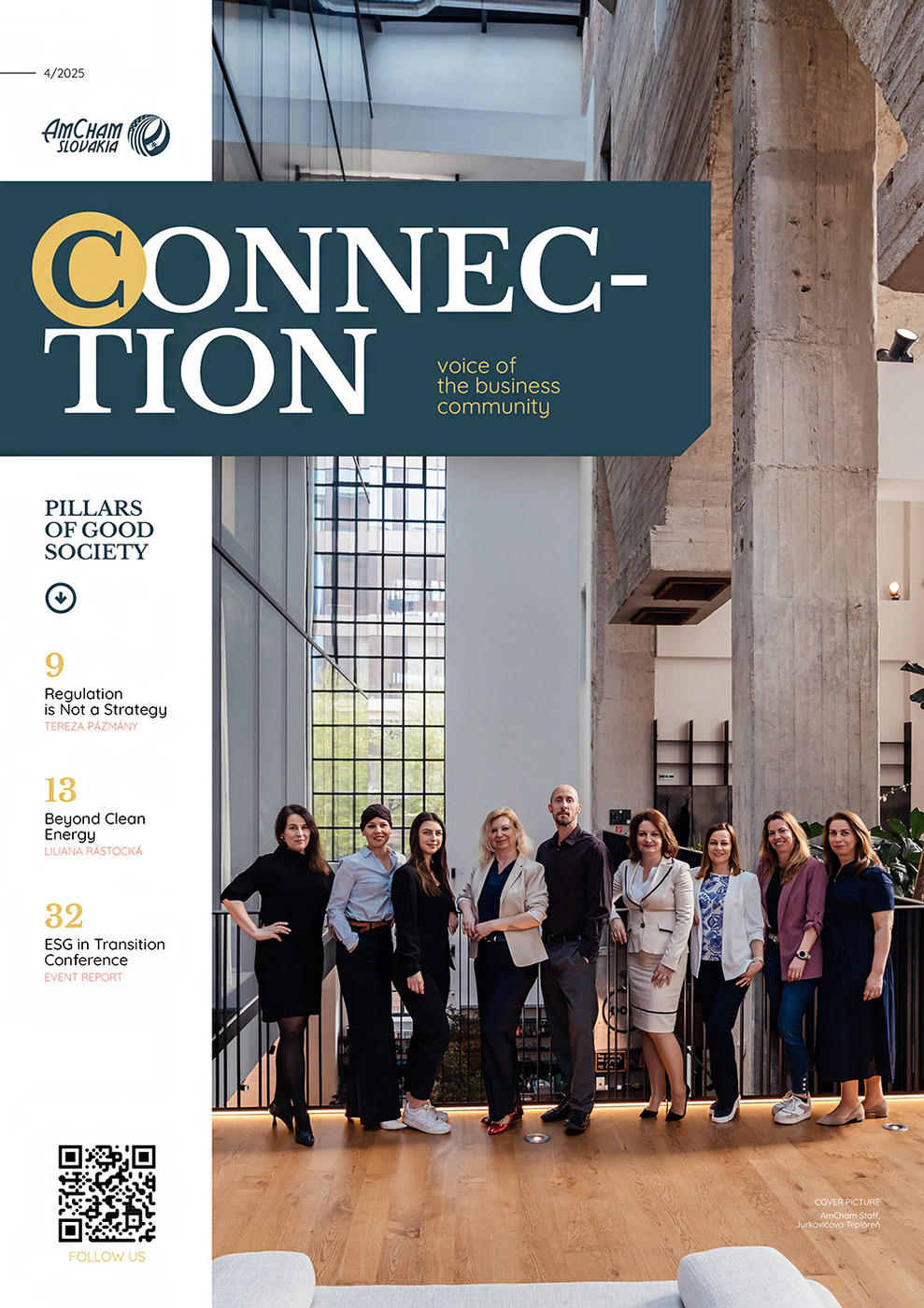
Download PDF
- Principle of the Triple Helix
- Regulation is Not a Strategy
- 30 Years Strong
- From Value to Impact
- Beyond Clean Energy
- Business Growth Through Diversity
- Inclusion Fuels Growth
- Leading Digital, Staying Human
- Smart Spending Saves Lives
- Modern Slovak Insolvency
- Work and Life Connections
- SWAN: A Homegrown Innovator
- ESG as the New Standard
- Legacy of Responsibility
- Building Sustainable Healthcare
- ESG in Transition: From Words to Action
Pillars of Good Society
Principle of the Triple Helix
The triple helix model of an innovation-driven society describes the
interactions between academia (research institutions and universities),
the business sector (including industry), and government to foster
economic and social development. Interaction between these three
entities might lead to new hybrid organizations that blend their
strengths: fundamental research, production of goods, and regulatory
expertise.
Regulation is Not a Strategy
In today’s fast-evolving ESG landscape, the most successful companies are not those that treat sustainability as a regulatory checkbox exercise, but those that embed it into their core strategy. This article explores why a well-defined sustainability strategy is now essential for long-term competitiveness, resilience, and stakeholder trust.
30 Years Strong
Long-term collaboration between corporations and NGOs is a powerful driver of societal impact. Citi’s 30-year partnership with JA Slovakia demonstrates how sustained CSR investments benefit both communities and companies—shaping future generations, strengthening employee engagement, and creating measurable social and business value.
From Value to Impact
In today’s environment, companies must demonstrate not only financial performance but also their broader contribution to society and economy. As they increasingly seek to define added value, socioeconomic impact assessments offer a structured, data-driven way to quantify how business operations support employment, income, public finances, and community wellbeing.
Beyond Clean Energy
Sustainability is not an abstract environmental goal but a fundamental responsibility to manage the present in a way that secures the future. For Slovakia, this responsibility has become a pressing fiscal imperative, driven by the need for a €5 billion domestic consolidation and a public debt projected to surpass 60% of GDP.
Business Growth Through Diversity
Innovation is key to business growth, yet many companies are overlooking one of their greatest competitive assets: diversity. According to McKinsey & Company’s Diversity Matters Even More, companies with the highest levels of gender diversity on executive teams are 39% more likely to outperform their peers financially.
Inclusion Fuels Growth
When discussing workplace diversity, many employers hesitate to include people with disabilities, worrying about lower performance or higher costs. In reality, hiring people with disabilities is a smart business decision.
Leading Digital, Staying Human
Melinda Szabó, CEO of Slovak Telekom and T-Mobile Czech Republic, shares what digital leadership means to her, how she views customer experience in the context of ESG, and why ESG is about the future of business rather than just reporting. We also discuss how digital infrastructure can accelerate innovation, support economic growth, and enhance the quality of education.
Smart Spending Saves Lives
At the time when healthcare complexity is increasing faster than ever before, making strategic choices and efficiently allocating financial resources in healthcare is crucial. A set-up that prioritizes treating diseases over prevention on a long term, is bound to be unsustainable regardless of the state of public finances.
Modern Slovak Insolvency
AmCham Slovakia’s Restructuring and Insolvency Task Force is driving efforts to modernize Slovakia’s insolvency framework amid ongoing economic challenges. Following April’s well-attended Restructuring Day, Senior Policy Manager Andrea Brezanová talked to Task Force Chair Viliam Myšička about EU legislation, recent legal amendments, and the practical steps needed to strengthen business resilience in Slovakia.
Work and Life Connections
Achieving professional success often involves navigating many challenges.The responsibility towards their families and their employees makes business leaders carefully consider each minute of their day. We want to know how they like to spend their time out of work, what inspires them and motivates them.
SWAN: A Homegrown Innovator
This year, Slovak telecommunications operator SWAN celebrates 25 years in business. We spoke with CEO Roman Vavrík about the company’s beginnings, key milestones, and future vision. What started as a student project has grown into one of the country’s major telecom players. Despite fierce competition from global corporations, SWAN has maintained its identity and ownership in Slovak hands.
ESG as the New Standard
Sustainability today is not merely a passing trend but a new standard. ESG principles influence not only corporate strategies but also marketing and brand building. It is more than just a legal obligation—when applied strategically, ESG delivers tangible added value to both companies and their partners.
Legacy of Responsibility
Family businesses often stand outside the spotlight of public attention. They are not multinational corporations that dominate media coverage. Yet, even if their role in the global economy is less frequently discussed, it is precisely family businesses that strongly influence economic growth and stability.
Building Sustainable Healthcare
By 2050, nearly one in three Europeans (29%) will be aged 65 or older. This significant demographic shift, compounded by the enduring impact of the COVID-19 pandemic, persistent health workforce shortages and competing funding priorities, is placing unprecedented strain on healthcare systems across Europe.
ESG in Transition: From Words to Action
The past weeks have been a powerful reminder that we are living in a
moment of transition, not only in climate policy but also in how
business sees its role in shaping the future. At AmCham Slovakia’s
recent ESG Conference “ESG in Transition: Staying Ahead in a Changing
World”, we challenged ourselves and our guests to go beyond compliance
and embrace transformation. The question we asked was simple but
crucial: how do we embed ESG into strategy, operations, and innovation
so that it drives real change rather than serving as just another
reporting obligation?

Follow us